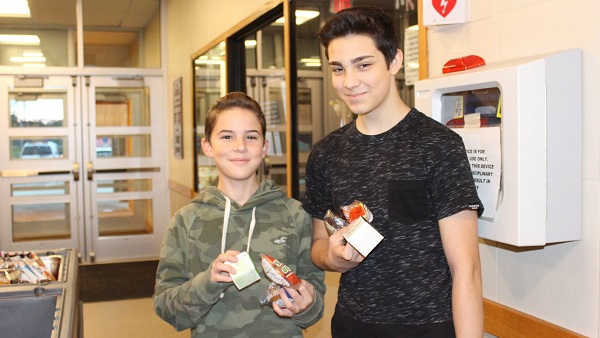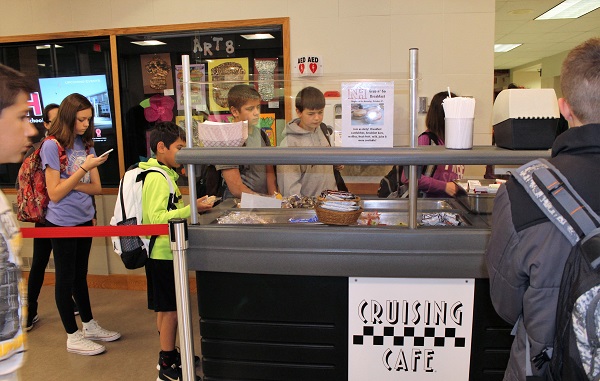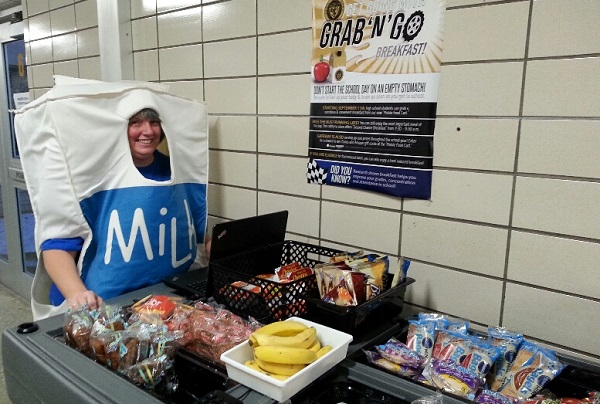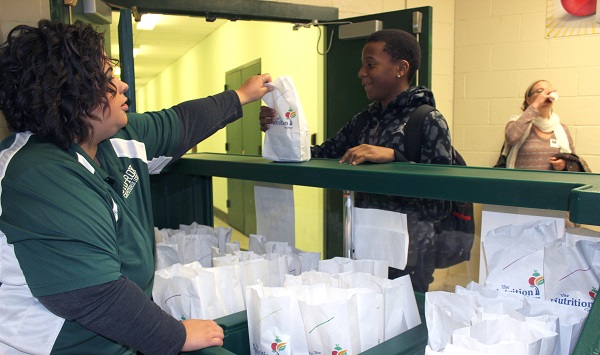
Grab-and-Go breakfast in schools promotes that all-important morning meal
Martin Lorenzo couldn’t understand it.
The food service director for Gateway School District knew more kids were eligible for the free breakfast program, but they weren’t taking advantage of hot meals provided in the high school cafeteria.
The solution?
Meet kids on their own turf by placing grab-and-go carts stocked with healthy breakfast items at convenient spots throughout the school.
“High school kids, being teenagers, Generation Z, they’re all about convenience, grab-and-go on the move,” Lorenzo says. “They want instant gratification. It’s just the way they’ve been wired with the technology revolution and smartphones. They want everything at their fingertips.”

The Grab and Go breakfasts carts are a pilot program of Allies for Children, a non-profit organization that advocates for the well-being of children in Allegheny County. Funded by a grant from the Henry Hillman Foundation, and implemented through the Greater Pittsburgh Community Food Bank, the food carts have been successful in five school districts.
- Gateway saw an increase from 159 to 276 participants in 2017-18 from the previous school year.
- At Sto-Rox Junior/Senior High School last year, 203 students used the grab-and-go carts, an increase of 54.
- West Mifflin High School went from 153 to 193 students.
- Participation at South Allegheny Middle/Senior High School increased from 186 to 235 students.
- North Hills Middle School served 55 students in 2017-18 after just three students took advantage of the program the previous year.
“This is a winner in so many different ways,” says Patrick Dowd, executive director of Allies for Children. “When you think about kids and think about their needs, this is an obvious one.”
In 2016, Gov. Tom Wolf set a goal to ensure that 60 percent of Pennsylvania students eligible for free or reduced-cost lunch were also served breakfast. Earlier this year, the governor’s School Breakfast Initiative provided $900,000 in mini-grants to school districts in the commonwealth.
The Grab-and-Go program serves a critical need in Western Pennsylvania. According to Just Harvest, 43,000 children in Allegheny Country – about 18 percent – face food insecurity.
“Think about what we’re asking kids to do during the day,” Dowd says. “We want them to pay attention, we want them to read, we want them to do math work, all the things you’re supposed to do during a school day. … We, as adults, have to figure out how to make this breakfast program work, and I think it’s happening now.”

At Sto-Rox, the breakfast carts are placed at strategic locations throughout the school. Food service director Nancy Hatton says that nutritional options are emphasized, with whole-grain blueberry and chocolate muffins the most popular items. Fruit, yogurt with granola, and cereal are also available, and the menu changes frequently.
Principal Tim Beck attributes increased participation in the program to convenience. “They grab it, sit with their buddies,” he says. “That’s what drives high school kids.”
Dowd thinks the increased participation may be partially due to mitigating an age-old problem: the embarrassment some kids feel because they rely on free meals.
“Some of the challenges that students face with things like breakfast or even lunch is the stigma associated with someone who qualifies for a free or reduced lunch,” Dowd says. “Trying to position (the carts) physically in places where kids are going to be, but also in a way that doesn’t have that stigma, is absolutely critical in making this work.”
Lorenzo agrees that sometimes students avoid free or reduced meal programs. “In their minds, school breakfasts are only for poor kids,” he says. The grab-and-go carts have mitigated that stigma at Gateway.

But at Sto-Rox, so many students are eligible for the program, there’s no stigma attached to accepting free breakfasts and lunches, says school superintendent Frank Dalmas. They may not want to stand in line in the school cafeteria, but they have no problem getting food from the carts.
To increase participation, Sto-Rox offers promotions, too.
“We didn’t just put the carts out there and expect kids to take food from them,” Dalmas says. “We did a lot of incentives over the last two years with prizes and awards. There are posters and advertisements, gift cards, to promote and push this. It takes the push and motivation from the staff to get this out to the kids, and once it gets to be a routine, it builds a momentum.”